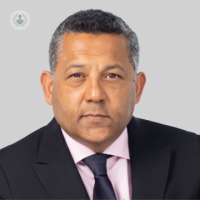Understanding thyroid surgery
Written in association with:The thyroid is a butterfly-shaped gland in the neck that produces hormones essential for regulating metabolism, growth, and development. When issues arise within the thyroid gland, surgery (also known as thyroidectomy) may be necessary to restore function and prevent further complications.
Mr Jean-Pierre Jeannon, renowned consultant ENT and head and neck surgeon, provides an expert insight into thyroid surgery.

What are the indications for thyroid surgery?
The main reasons for thyroid surgery include:
- Thyroid cancer: Thyroid cancer is a primary reason for thyroid surgery. If a biopsy confirms cancer in the thyroid gland, surgery is usually required to remove the affected portion of the gland.
- Thyroid nodules: Thyroid nodules are abnormal lumps or growths that form within the thyroid gland. While many nodules are benign (non-cancerous), some can be malignant (cancerous) or cause symptoms due to their size or location, requiring surgery.
- Hyperthyroidism: Hyperthyroidism is a condition where the thyroid gland produces excessive amounts of thyroid hormones, causing symptoms. In cases where medication or radioactive iodine treatment is ineffective, surgery may be recommended to control hormone production.
How is thyroid surgery performed?
Thyroid surgery varies based on how much of the thyroid gland needs to be removed. The different types of thyroid surgery include:
- Total thyroidectomy (all of the thyroid gland is removed)
- Lobectomy (only one lobe (half) of the thyroid gland is removed)
- Subtotal thyroidectomy (most of the thyroid gland is removed, but a small portion is left)
Thyroid surgery is performed under general anaesthesia, meaning you will be asleep and pain-free during the operation. Before surgery, you will undergo a series of tests including blood tests, imaging tests, and possibly a fine-needle aspiration biopsy.
During thyroid surgery, your ENT surgeon will make a small incision in the lower front of your neck to reach the thyroid gland. The location of this incision will usually be along a natural skin crease to minimise visible scarring.
Depending on the type of surgery, your surgeon will then carefully remove the affected portion or all of the thyroid gland. Special care will be taken to avoid damaging nearby structures, such as the parathyroid glands and the recurrent laryngeal nerve. If there are lymph nodes involved (as in thyroid cancer), these will also be removed.
You surgeon will close the incision with sutures or surgical glue. In some cases, a small drain will be placed to remove any excess fluid from the surgical site. Most patients will be able to go home the same day or the following day.
How long is the recovery period after thyroid surgery?
Immediately after surgery, you may experience discomfort, swelling, and bruising in the neck area, which is typically managed with over-the-counter pain relievers. You will also be advised to rest and keep the incision site clean and dry.
Long-term, most patients will return to work and normal activities within two to four weeks after surgery, though heavy lifting and strenuous exercise will need to be postponed depending on your surgeon’s advice. The incision will gradually heal, with any visible scar fading over time.
Will I need to take thyroid hormone replacement after surgery?
Whether or not you will need to take thyroid hormone replacement after surgery depends on the type of thyroid surgery you had and the remaining function of your thyroid gland.
If only one lobe of the thyroid is removed and the remaining lobe is healthy, it may produce enough thyroid hormone to meet the body's needs. In this situation, thyroid hormone replacement might not be required. However, some patients may still require supplementation if the remaining lobe doesn’t function adequately.
Patients who undergo a total thyroidectomy will need to take thyroid hormone replacement for the rest of their lives. This is because the entire thyroid gland, which produces essential hormones, has been removed. The synthetic hormone (levothyroxine) taken will replace the natural thyroid hormone and help regulate metabolism and other bodily functions.
If you would like to book an appointment with Mr Jeannon, head on over to his Top Doctors profile today.


